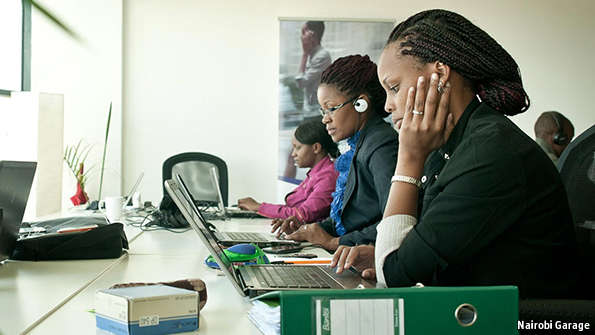March 23, 2015
AFRICA may be prone to chronic power shortages, weak infrastructure and economies still overly-dependent on commodities. But it is also being seen by technology firms as a new frontier for innovation: herds of new tech start-ups and small businesses are being birthed across the continent.
Almost as innovative as their plans for providing mobile money or clever new applications for hailing taxis are their methods of overcoming some of the continent’s main impediments to technology innovation: expensive internet access and the high costs of renting office space with reliable power. Their solution has been to take a leaf from the books of entrepreneurs in places such as Silicon Valley and the Old Street roundabout by setting up “hubs” or co-working spaces. A recent World Bank report conservatively estimated there are over 90 hubs across Africa; in reality there are many more.
While co-working spaces are heralded in the rich world as trendy, open spaces conducive to networking and brainstorming, in Africa they serve a far more practical purpose: co-working spaces mitigate the exorbitant costs of setting up and running an office. In Kenya, standard commercial office spaces in Nairobi and Uganda cost about $15-16 per square metre a month. Costs in Nigeria are significantly higher, with prices in the range of $40-70 per square metre. The smallest units available are usually no less 100 square metres and most offices are much larger. Smaller, less expensive spaces—often extra rooms or booths in a larger building—can be found via classifieds listings, with monthly rental prices for a two to three man team starting at around $500 in Nairobi to $1,000 in Lagos. These base rental costs are supplemented by service charges, management costs, security and power. On top of all that come the costs of the important facilities critical to the running of tech-based company.
With the power grid unreliable across much of Africa, fuel-powered backup generators often save the day and enable work to go on, but at a significant cost. “Power outage is a daily occurrence. Supply from the grid is less than three hours out of the 12 hours that the hub is open for business daily,” says Olatunbosun Tijani, general manager at Nigeria’s Co-Creation Hub (CcHub) based in Lagos. Mr Tijani says the hub keeps two generators—one of 200kVA and one of 60kVA—and puts the monthly cost of diesel and maintenance for both generators at over $6,000, or $72,000 per year. Even the initial costs of installing a generator are significant. Hannah Clifford, general manager of Nairobi Garage—the largest co-working space in the city (pictured)—puts the cost of a generator at around $1300.
Good internet connectivity is also a big plus-point for co-working spaces, which boast high-speed lines that are out of the reach of most small organisations. Often hubs have their internet access sponsored by cable companies who wish to polish up their images by supporting African entrepreneurs. The Nairobi Garage has a dedicated line of 25Mbps, which is sponsored by Seacom, submarine cable operator; it also has a backup dedicated line of 10Mbps sponsored by Safaricom, a mobile-network operator. Ms Clifford says a dedicated line of 25Mbps would normally set a company back approximately $3,000-4,000 a month. On the other side of the continent, CcHub has its 45 Mbps line sponsored by MainOne Cable Company.
Charges levied on businesses working out of co-working spaces vary. At Nairobi Garage resident companies are charged KES20,000 ($220) per person a month for the premium package, which includes perks such as priority access to a boardroom, storage, printing and branding rights. Kampala’s Outbox charges its companies $60 per person each month; CcHub charges an annual fee of $200 per person. Flexibility is also part of the deal. Most hubs do not hold their residents to long contracts, and there are no minimum rental terms. That allows small firms to scale up and down as needed each month.
Source: Economist




